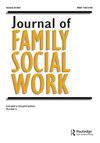Practitioners’ experiences of using blended models within family support: A proof of concept study involving Cognitive-Behavioural Therapy (CBT), Multisystemic Therapy (MST) and Incredible Years (IY) interventions
IF 0.7
Q3 SOCIAL WORK
引用次数: 1
Abstract
ABSTRACT Evidence-based models have demonstrated significant potential for improving outcome. However, it has been proposed that single-issue interventions cannot adequately address the multiple needs that some families experiences. This paper outlines a novel approach in which three evidence-based practices (Multisystemic Therapy, Incredible Years, and Cognitive-Behavioural Therapy) were concurrently implemented within the same programme. The objectives are to explore the experience and perceptions of practitioners who implemented the blended model, to explore the novelty of blended approaches, to examine the extent to which families were engaged in and were retained in this programme, and compare the outcomes for families who received blended and nonblended approaches. Method: Data was collected for 158 families between March 2014 and March 2016. Thirty-one families engaged in the blended approach. to explore the feasibility, semistructured interviews were undertaken with 14 staff. Results: Not all families are in need of a blended approach, but families who experience multiple complexities may benefit more from this type of approach. From the perspective of practitioners, blended models provide an opportunity to address multiple needs within the family. However, there are implementation challenges that could be explored further.从业者在家庭支持中使用混合模式的经验:一项涉及认知行为疗法(CBT)、多系统疗法(MST)和不可思议的岁月(IY)干预的概念验证研究
基于证据的模型已经显示出改善结果的巨大潜力。然而,有人提出,单一问题的干预措施不能充分解决一些家庭所经历的多重需求。本文概述了一种新颖的方法,其中三种循证实践(多系统治疗、不可思议的岁月和认知行为治疗)在同一项目中同时实施。目的是探索实施混合模式的从业人员的经验和看法,探索混合方法的新颖性,检查参与和保留该计划的家庭的程度,并比较接受混合和非混合方法的家庭的结果。方法:2014年3月- 2016年3月对158个家庭进行调查。31个家庭采用了混合方法。为了探讨可行性,对14名工作人员进行了半结构化访谈。结果:并非所有家庭都需要混合方法,但经历多重复杂性的家庭可能从这种方法中受益更多。从从业者的角度来看,混合模型提供了一个处理家庭内部多种需求的机会。然而,还存在一些有待进一步探索的实现挑战。
本文章由计算机程序翻译,如有差异,请以英文原文为准。
求助全文
约1分钟内获得全文
求助全文
来源期刊

Journal of Family Social Work
SOCIAL WORK-
CiteScore
2.10
自引率
0.00%
发文量
4
期刊介绍:
Each issue of the Journal of Family Social Work contains peer reviewed research articles, conceptual and practice articles, creative works, letters to the editor, and book reviews devoted to innovative family theory and practice subjects. In celebrating social workers" tradition of working with couples and families in their life context, the Journal of Family Social Work features articles which advance the capacity of practitioners to integrate research, theory building, and practice wisdom into their services to families. It is a journal of policy, clinical practice, and research directed to the needs of social workers working with couples and families.
 求助内容:
求助内容: 应助结果提醒方式:
应助结果提醒方式:


